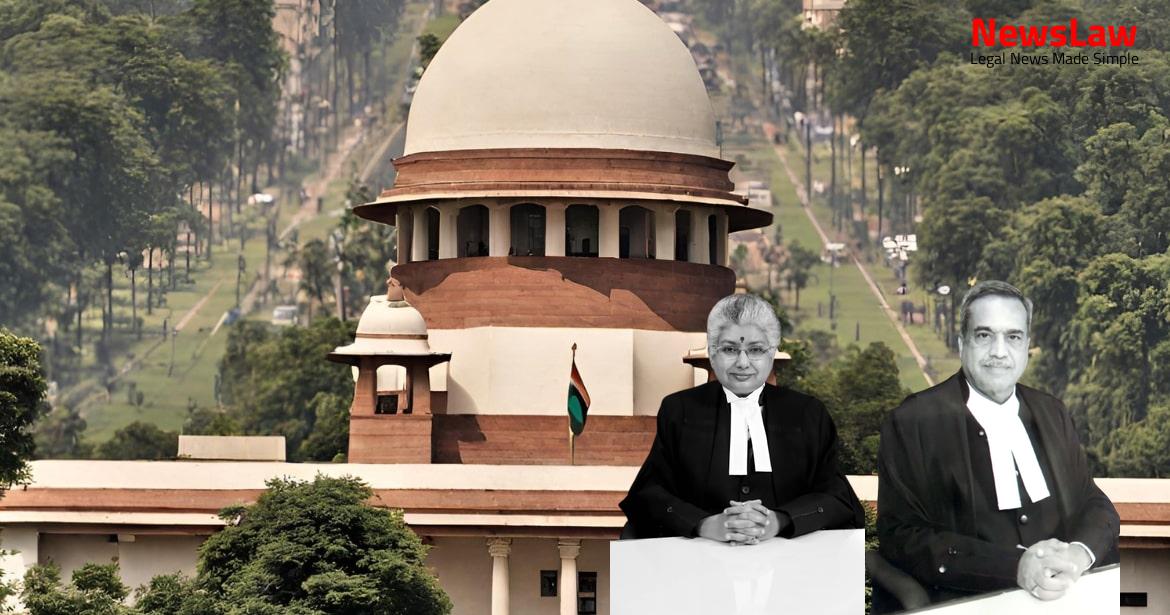Delve into the complex legal analysis conducted by the court regarding a compromise order in an employment dispute. The court meticulously examined the legal basis of the compromise, ensuring fairness and non-discrimination in the implementation of employment policies. The case sheds light on the importance of upholding legal principles in settling disputes and providing relief to aggrieved parties.
Facts
- The compromise order was not based on the merits of the case but on a compromise agreement.
- Aggrieved candidates sought to piggyback on the compromise order, claiming they were similarly situated.
- Guidelines for recruitment required viva voce assessments.
- TANGEDCO was directed to appoint ITI Helpers based on previous court orders.
- The court suggested relaxing the upper age limit for candidates due to long-existing vacancies.
- TANGEDCO relaxed the age limit for ongoing selection processes.
- Candidates found suitable were appointed based on combined assessments of marks and viva voce.
- Justice Khalid’s report emphasized accommodating existing and skilled workers without affecting the Board’s activities.
- TANGEDCO was directed to offer employment to similarly placed candidates who had not approached the court earlier.
- Late Mr. Justice Khalid was appointed to recommend better methods for filling vacancies by accommodating workers.
- Candidates who underwent apprenticeship training were not given preference for selection.
- Candidates who had not filed writ petitions earlier were not able to benefit from the compromise order.
- The Division Bench’s compromise order directed the appointment of 84 persons based on the agreement.
- Candidates who were not selected approached the Madras High Court in a batch of writ petitions.
- The writ petitions were not posted along with W.P. No 9125 of 2014 batch cases during final hearing and are now pending and posted along with the above writ appeals.
- TANGEDCO resisted the petitions, stating that the interview process was not arbitrary.
- A compromise was reached between the parties, where TANGEDCO indicated willingness to accommodate all writ petitioners.
- A notification was sent to the Commissioner, Employment Exchange, Guindy, to sponsor ITI Candidates in each category in a specific ratio.
- Some writ petitions were filed to relax the upper age limit for filling up vacancies of ITI Helper (Trainee) in TANGEDCO through direct recruitment.
- Apprentice-trainees did not have an automatic right to appointment.
- It was argued that introducing interview/viva voce changed the rules after commencement.
- The first writ appeal was heard on multiple occasions and a compromise was reached between the respondents corporation and appellants/petitioners.
- Unsuccessful candidates filed appeals, underwent a viva-voce test despite the compromise.
- The dispute involved the introduction of a viva-voce test by TANGEDCO after initially deciding not to follow it.
- 10,728 candidates attended the interview process.
- The selection of 4000 ITI Helpers (Trainee) was based on academic and viva-voce performance.
- An advertisement was issued for apprenticeship candidates to participate in the interview.
Also Read: Legal Analysis of Claim for Loss of Profit in Delayed Contract
Arguments
- The aggrieved appellants challenged TANGEDCO’s refusal to grant relaxation of the upper age limit
- TANGEDCO did not fill the vacancies for a long period
- TANGEDCO argued that the compromise order was not based on merits and should not be binding on non-approaching parties
- TANGEDCO insisted on fair implementation of the policy decision to offer employment to unsuccessful candidates
- The compromise order did not decide the dispute on merits, it only recorded the terms of compromise
- The compromise order was considered binding only between the parties and not as a precedent for non-approaching parties
- TANGEDCO was accused of acting unfairly and in a discriminatory manner by not offering employment to those who did not approach the court
- The aggrieved appellants argued that there was no distinction between them and those offered employment, and the order had no precedential value
- Courts can only grant relief based on legal provisions, not on mere concessions like the compromise order
- The compromise order regarding the age limit exemption was not legally sound.
- The rejection of the appellants’ representation based on the compromise order was justified.
- The initial grievance was regarding the denial of age limit relaxation, which was found to be valid in the first round of litigation.
- TANGEDCO complied with the court’s directive to grant the age limit exemption.
- TANGEDCO later clarified its recruitment process, including an interview with proposed weightage.
- The order based on a concession must be shown to be merit-based and independently justified by the court to compel a public employer to provide identical relief.
Also Read: Public Declaration Requirement in Marriage under Hindu Marriage Act
Analysis
- The court emphasized the importance of scrutinizing compromises to ensure their lawfulness.
- The principle of laches and acquiescence was highlighted, stating delayed claims may not be considered.
- The rejection of petitions based on compromises was deemed discriminatory and violative of Article 14 of the Constitution.
- The court expressed the need for fair treatment of all candidates and criticized the acceptance of compromise without merit scrutiny.
- It was noted that compromises must not prejudice others’ rights, and public bodies should not pursue untenable submissions.
- The legislative empowerment of Gram Panchayats under Part IX of the Constitution was referenced.
- Candidates were advised not to delay approaching the court and to ensure their claims are based on merit and not on laches or acquiescence.
- Principle of treating all similarly situated persons similarly applies in service matters.
- Exception to this principle does not apply in cases where judgment benefits all similarly situated persons, whether they approached the Court or not.
- Obligation is on authorities to extend benefits to all similarly situated persons in such cases.
- Article 14 of the Constitution is not meant to perpetuate illegality or fraud.
- Benefit conferred without legal basis cannot be relied upon as a principle of parity or equality.
- In cases where concession-based orders could (or could not) be treated as precedent, the correct approach must be followed.
- Subsequent litigants seeking benefits from orders made in others’ cases must approach the courts in time, without delay or laches.
- A wrong decision in favor of a party does not entitle any other party to claim benefits from it.
- The aggrieved appellants and respondent applicants in TANGEDCO’s appeal could not claim benefit of parity.
- Writ petitions were based on a compromised order, which is not justified by law.
Also Read: OCI Cardholders’ Rights and Retroactive Notifications
Decision
- The appeals of the aggrieved appellants against the judgment and order of the Division Bench of the Madras High Court dated 02.08.2018 are dismissed.
- No order as to costs is given in the circumstances of this case.
- TANGEDCO’s appeals against the order of 29.04.2019 of the Madras High Court in various cases succeed and are allowed.
Case Title: R. MUTHUKUMAR Vs. THE CHAIRMAN AND MANAGING DIRECTOR TANGEDCO (2022 INSC 157)
Case Number: C.A. No.-001144-001144 / 2022



